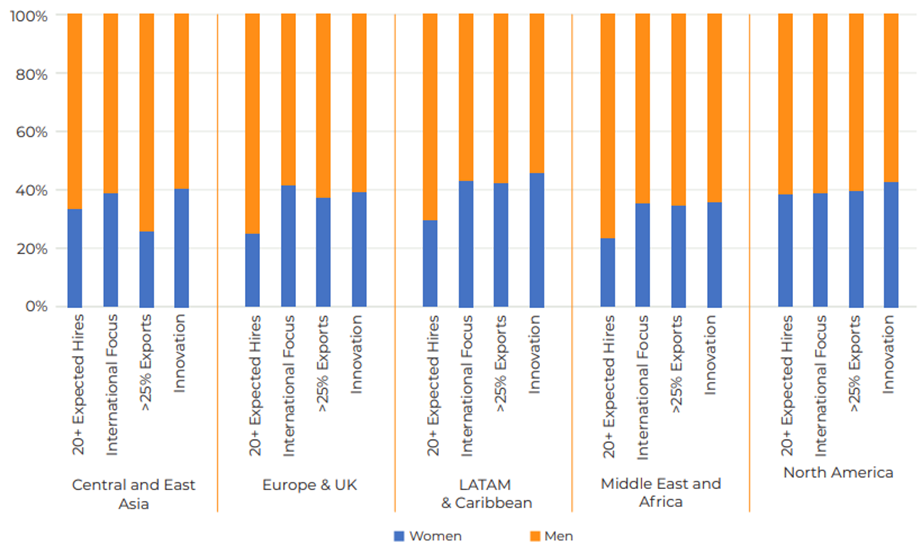GEM 2022/2023 Women’s Entrepreneurship report: Challenging Bias and Stereotypes
March 1 ,2024


March 1 ,2024
Latin America and the Caribbean stand out as the most entrepreneurial region in the world for women, boasting the highest startup rate for women (21.2%) and entrepreneurial intentions (33.3%), as well as the smallest gender gap for both indicators (W/M 0.85, 0.89). Nine countries in this region participated in the 2022 GEM survey, including five middle-income (Mexico, Chile, Panama, Uruguay and Puerto Rico) and four low-income (Brazil, Colombia, Venezuela and Guatemala). However, indicators for this region also suggest that the business context is more volatile for new businesses and more often results from job scarcity, especially for women.
Importantly, Latin America and the Caribbean showed the highest business exit rate for women (6.6%) and startup rate. It also had the lowest established business rate for women (4.7%), suggesting a high rate of business turnover and difficulty for women building an enduring business. Notably, Guatemala and Colombia led all other countries globally in 2022 for the highest startup activity rates for women (28.1% and 26.1%, respectively). The lowest rate of startup activity for women in Latin America and the Caribbean was found in Venezuela (15%), and the widest gender gap was in Brazil (W/M 0.75).
About 5% of women in the LATAM regions reported leading established businesses with the largest gap globally (W/M 0.61). That said, entrepreneurial intentions are the highest in this region, with one in three women reporting plans to start a business. Established business rates for women vary from a high of 9.6% in Guatemala, with the lowest regional gender gap (W/M 0.71), to a low of 3.5% in Puerto Rico, which also showed the largest gender gap (W/M 0.44). Entrepreneurial intentions were lowest for women in Mexico but actually higher than for men (17.9% W/M 1.05).
Globally, 58.4% of women in LATAM reported knowing an entrepreneur, rising to over two thirds of women in Brazil, Chile and Guatemala. LATAM also showed one of the highest rates of women’s informal investment across regions at 9% but with the largest gender gap (W/M 0.63) and much lower average investment sizes than men (W/M 0.58).
Similarly, women entrepreneurs in LATAM also showed high involvement in high potential startups. Women in this region represent one third of businesses starting with 20+ jobs and expecting 20+ hires within five years. Women also represented more than two fifths of new firms focused on international markets, with exports >25%, and involved in innovation. Notably, women represented over half of the entrepreneurs focused on an international market in Puerto Rico and over half of the high-export startups in Chile and Guatemala.

Globally, women in the LATAM region reported the lowest rates of ICT startups (0.6%, W/M 0.21) and the highest rate of solo enterprises (44.5%, W/M 1.55) across regions. These structural differences likely contribute in significant ways to any observed gender differences in business impacts on the economy and society. One important exception is Panama, where women were six times more likely than men to start a business in the ICT sector (1.8%, W/M 6.0). Also, solo enterprise rates were the lowest for women in Venezuela but more than twice as high as men (9.5%, W/M 2.38).
Women entrepreneurs in LATAM were more likely than men to say that digital tools were not necessary for business operations (38%, W/M 1.07) but also more likely than men to report adopting new digital tools in response to the pandemic (22.6%, W/M 1.17). Moreover, three quarters of women entrepreneurs in this region reported plans to adopt new digital tools in the near future at parity with men (74.5%, W/M 1.01). In fact, new digital tool adoption plans were at parity or higher for women than men in all countries except Mexico and Uruguay.
While SDG awareness was lowest globally for women in the LATAM region (11.9%, W/M 0.85), sustainability indicators were overall some of the highest in the world. Four out of five women reported prioritizing sustainability goals over economic goals in LATAM more often than men (W/M 1.05). Moreover, about four fifths of women entrepreneurs reported considering social and environmental sustainability goals in business decisions, close to parity with men. Sustainability practices were also high for LATAM women, especially in Brazil, where more than nine in ten women reported recent practices to maximize environmental sustainability and more than four in five for social sustainability.
Source: GEM 2022/2023 Women’s Entrepreneurship report: Challenging Bias and Stereotypes, Global Entrepreneurship Monitor (GEM) (https://www.gemconsortium.org/file/open?fileId=51352)
